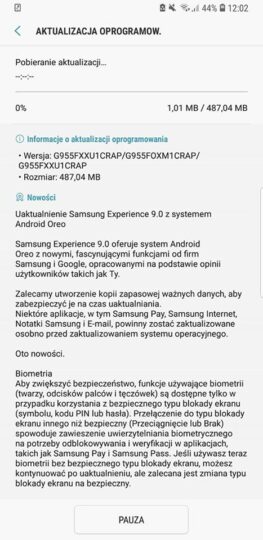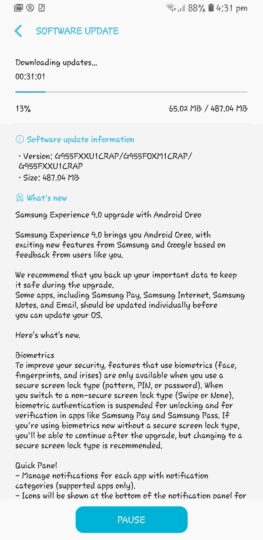Qualcomm announced yesterday that it’s now working with more than a dozen smartphone manufacturers to bring 5G-enabled devices to the market. These manufacturers will use the company’s Snapdragon X50 5G NR modem in their handsets to launch smartphones compatible with the next-generation network in 2019.
The list of global OEMs that are working with Qualcomm on this has some big names but one would be surprised to see that the world’s biggest smartphone vendor – Samsung – is not on the list. This suggests that despite their recent partnership to enhance cooperation in various areas of technology through the transition to 5G, Samsung won’t make devices with Qualcomm’s 5G modem.
Qualcomm’s Snapdragon X50 5G modem
We first heard about Qualcomm’s X50 modem in 2016. 5G NR or “New Radio” is the first 5G specification which is currently being standardized by the standards body 3GPP. The “NR” will basically be used for describing 5G like LTE or Long-Term Evolution became synonymous with 4G. Qualcomm says that it designed the X50 5G modem to support early 5G networks in order to make the promise of 5G a reality.
When coupled with a Snapdragon processor with an integrated Gigabit-class LTE modem, the complete Snapdragon 5G platform can provide multi-mode 4G/5G support. The 4G LTE fallback support is crucial because even though 5G smartphones will hit the market by next year, it’s going to take some time before carriers in major markets flip the switch on their 5G networks.
Qualcomm claims that its X50 modem can hit a top speed of 5Gbps by using Multiple-Input Multiple-Output or MIMO in the 28GHz frequency band which is a part of the millimeter Wave or mmWave spectrum. This is made possible by mmWave front-end radio hardware having a lot of antennas which enables aggressive MIMO utilization.
MIMO is basically the parallelization of radio communications via multiple antennas with each antenna handling one data transfer at a time. The idea behind this is to get a higher aggregate data rate by increasing the number of simultaneous data transfers.
As previously mentioned, many popular OEMs have decided to use Qualcomm’s X50 5G NR modem for 5G devices due next year. The list includes the likes of Xiaomi, ZTE, Oppo, LG, HTC, Asus, Sony and others. Samsung, the world’s largest smartphone vendor by quite a margin, is not on the list and neither are Apple and Huawei.
It’s not surprising to see that Huawei isn’t on the list because the Chinese giant doesn’t use Qualcomm chipsets. However, both Samsung and Apple use Qualcomm processors in some of their devices, so one would have expected to see them on this list.
Apple and Qualcomm have been involved in a complex legal battle for quite some time now and there are reports that the former is thinking about ditching Qualcomm modems completely. Intel is now expected to supply the modems for Apple’s 2018 iPhones.
Samsung’s Exynos 5G modem
Samsung relies on Qualcomm’s Snapdragon processors for variants of flagship handsets like the Galaxy S8 that it ships in select markets such as North America, so what’s the deal here, why don’t we see Samsung on the list even though both companies recently decided to expand their 2009 global patent cross-license agreement, put their regulatory tussle aside and enhance cooperation for future technologies like 5G?
Some of you might not be aware that Samsung is pretty good at making its own cellular modems. The company recently announced its Exynos 9810 chip, the processor which will power the Galaxy S9, and it’s coupled with Samsung’s new Cat.18 LTE modem.
The company claims that this modem is the first in the industry to support 6CA (carrier aggregation) and that it’s capable of achieving a maximum download speed of 1.2Gbps. It’s similar to the Snapdragon 845’s X20 LTE Cat.18 modem that also promises download speeds of 1.2Gbps. Samsung will use the Snapdragon 845 for some models of the Galaxy S9 and the Galaxy S9+.
The new Cat.18 LTE modem is the successor to Samsung’s Cat.16 LTE modem that debuted with the Galaxy S8, making last year’s flagship the first smartphone on the market capable of hitting gigabit download speeds.
Samsung is fully capable of developing its own cellular modems that can match and even best what Qualcomm comes up with. The reason why we don’t see Samsung on this list is that the company is developing its own Exynos 5G modem. Recent reports suggested that it showcased the new modem to industry partners behind closed doors at CES 2018 last month. The Exynos 5G modem is also expected to promise speeds of up to 5Gbps with fallback compatibility with 4G LTE, 3G and 2G networks.
The modem is said to support both frequency bands below 6Ghz as well as high-frequency mmWave bands such as 28GHz and 39GHz. It reportedly complies with the 3GPP’s draft standard for Release 15, the initial 5G specification will is due to be completed by June this year. It’s also said to include support for the 3GPP’s non-standalone (NSA) and standalone (SA) standards, the former for supporting connection to older LTE towers and the latter for new networks built entirely on 5G infrastructure.
Samsung is expected to officially reveal its 5G modem later this year before a commercial launch next year. The Exynos 5G modem will enable Samsung to use more of its own components in handsets and thus allow it to reduce its reliance on Qualcomm for cellular modems. It won’t have to pay Qualcomm for them too so that’s an added benefit. We can keep our fingers crossed that at least one of the two flagship smartphones that Samsung releases annually will get the Exynos 5G modem next year.
Are you looking forward to seeing 5G smartphones from Samsung in 2019? Share your thoughts with us in the comments below.
The post Despite partnership, Samsung not likely to use Qualcomm’s modem for its 5G smartphones appeared first on SamMobile.
from SamMobile http://ift.tt/2sfHwmu
via
IFTTT








